If you’re reading this, chances are you have chickens that you consider pets and everyone enjoys spoiling their pets with treats, right? We get a kick out of seeing them run to greet us at the sight of the treat container or the sound of the back door opening. It makes us feel good to see them happy and we are entertained by their antics when they compete for coveted snacks. But the wrong treats and treats in excess can be harmful to their health, stunt growth, shorten their lifespan and interfere with egg production. So, we should be aware of what can they eat, what should they not eat and how much is too much.
A good rule of thumb is: if you shouldn’t eat it, your pet chickens shouldn’t either. Common sense should be the guide in treat selection. The types of foods we require to maximize our own health are the foods we should consider when spoiling our chickens: high protein, whole grains, low salt, low sugar, fruits and vegetables. Milk products are an exception to this general rule as too much can cause digestive upset and diarrhea. Probiotics are a much better choice for chickens for gut health and most complete feeds already contain probiotics and prebiotics.
HOW YOUNG?
Every new chicken-keeper wants to know how soon fluffy babies can eat treats. Given their tiny size and amount of feed intake, small amounts of treats can interfere with a chick’s nutritional balance. A chick’s growth, development and ability to defend against illness can be negatively affected by too many treats- even healthy choices. I am pretty conservative with baby chicks and snacks. It is fun to spoil them, but I feel that the potential harm outweighs any feel-good benefit and I do not offer my chicks treats at all.
While not a treat, it bears mentioning that oyster shell should never be given to chicks or non-laying chickens as it can interfere with bone development and cause organ damage.
EVERYTHING IN MODERATION
When chickens eat treats, they’re not eating feed, which is their primary source of nutrition. Commercially prepared feed is very carefully prepared by poultry nutritionists who carefully monitor the composition of ingredients to ensure that a chicken’s daily vitamin, mineral and protein requirements are met. Supplemental foods (treats/snacks) replace a portion of those essential dietary elements to some degree. Excessive treats, even healthy ones, can cause any of the following: obesity, reduced egg production, malformed eggs, habitual laying of multiple-yolked eggs, vent prolapse, a protein deficiency, feather-picking, fatty liver syndrome, increased risk of heat stroke and heart problems. Treats should be limited to no more than 5% of a chicken’s diet, which amounts to approximately 2 tablespoons of treats in any given day. Treats/scraps/snacks should not be fed to chickens daily due to the obesity-related health concerns which have reached epidemic proportions in backyard chickens. Poultry veterinarian Dr. Annika McKillop recommends cleaning up any treats they have not consumed within 15 minutes.
HEALTHY TREATS for CHICKENS
Proteins: beef, chicken, (I know, it seems wrong), eggs, (cooked only so as not to encourage egg-eating) fish, insects (crickets are delicious!) pork, worms (earthworms, mealworms), sunflower seeds (shells on)
Fruits: apples, peeled bananas, berries, coconut flesh, grapes, melon, peaches, pears, pomegranates, strawberries, raisins
Vegetables: asparagus, beans (fully cooked if previously dried), beets, broccoli, cabbage, carrots, cauliflower, corn, cucumbers, eggplant, greens, (kale, spinach, mustard) peas, peppers, pumpkin and raw pumpkin seeds, squash
Whole Grains: bread, cereal, pasta, sprouts.
Sprouting grains is an easy way to provide chickens with fresh, nutritious greens any time of year with very little effort. Learn how HERE!
Looking for a homemade treat recipes? Look no further!
Other treats that I have made for my chickens include my Peeps’ Pumpkin Pie,Chickens’ Soup, Molt Muffins and Alfalfa Cake Protein Treats. Click on the links for the recipes!
OCCASIONAL TREATS
- avocado flesh (but not skin or pits)
- tomatoes (can cause gastric upset in large quantities)
- potatoes (but not green parts)
ABOUT SCRATCH
Scratch is affectionately referred to as ‘chicken crack’ for a reason; chickens love it, can’t get enough of it and it’s not healthy for them. Scratch typically consists of cracked corn and a mixture of grains, which tends to lack an appreciable amount of protein, vitamins and minerals. Scratch should be thought of as chicken candy and only given in small amounts occasionally, if at all. *Scratch should not be mixed into the flock’s feed.* I never give my flock scratch.
- moldy foods
- uncooked, dried beans (contain phytohaemagglutinin, which is highly toxic to humans and animals)
- chocolate
- coffee
- alcohol
- tobacco (even discarded cigarette butts can contain enough nicotine to be deadly to birds)
Cooked eggs are a good source of protein for chickens, which can be helpful during a molt, but a better idea is to switch to a higher protein chicken feed for a few weeks. More info on that here.
MYTHS AND FACTS ABOUT CHICKEN TREATS
FACT: “Many foods and food additives that are safe for human consumption can be extremely toxic to pets.”
MYTH: Chickens should not eat avocados.
FACT: Chickens can eat the flesh of avocado in moderation. However, avocado pits and skin contain persin, which can be toxic in significant quantities.
MYTH: Chickens should not eat raw potatoes or potato skins.
FACT: Chickens should not eat GREEN potato skins. The green color indicates the presence of solanine, a toxin that affects the nervous system when consumed in large quantities. However, the average, healthy human would have to eat 4.5 pounds at one sitting to experience any neurological effects. Similarly, a chicken would need to consume large quantities of green potato skins to experience any effects. The leaves and stems of the potato plant levels of solanine that could be toxic to chickens in large amounts.
MYTH: Chickens should never eat onions.
FACT: Chickens can eat onions, chives and garlic in small quantities, occasionally. Sufficient quantities of onion and garlic can be harmful to chickens, causing hemolytic anemia, aka: Heinz anemia. “The alkaloid N-propyl disulphide is present in cultivated and wild onions, chives and garlic, and affects the enzyme, glucose-6-phosphate dehydrogenase in red blood cells,” which can cause Heinz anemia.
“Allicin, which gives garlic its odor, is also a strong oxidant. In rare cases, this chemical can be dangerous and can cause Heinz body hemolytic anemia, as well.”
Homemade Flock Block Substitute. Recipe HERE.Frozen scrambled EggPops. Instructions HERE.Peeps’ Pumpkin Pie, recipe HERE.
Sources and further reading:
www.poultryhelp.com
www.exoticpetvet.net
www.avocado.com
www.merckvetmanual.com (salty foods are okay in moderation, occasionally as long as there is plenty of fresh water available, but never salt alone)
www.wikipedia.org
www.merckvetmanual.com
www.peteducation.com
www.ncbi.nlm.nih.gov
Hidden Dangers in the Kitchen
Kathy Shea Mormino
Affectionately known internationally as The Chicken Chick®, Kathy Shea Mormino shares a fun-loving, informative style to raising backyard chickens. …Read on


shop my SPONSORS
If you’re reading this, chances are you have chickens that you consider pets and everyone enjoys spoiling their pets with treats, right? We get a kick out of seeing them run to greet us at the sight of the treat container or the sound of the back door opening. It makes us feel good to see them happy and we are entertained by their antics when they compete for coveted snacks. But the wrong treats and treats in excess can be harmful to their health, stunt growth, shorten their lifespan and interfere with egg production. So, we should be aware of what can they eat, what should they not eat and how much is too much.
A good rule of thumb is: if you shouldn’t eat it, your pet chickens shouldn’t either. Common sense should be the guide in treat selection. The types of foods we require to maximize our own health are the foods we should consider when spoiling our chickens: high protein, whole grains, low salt, low sugar, fruits and vegetables. Milk products are an exception to this general rule as too much can cause digestive upset and diarrhea. Probiotics are a much better choice for chickens for gut health and most complete feeds already contain probiotics and prebiotics.
HOW YOUNG?
Every new chicken-keeper wants to know how soon fluffy babies can eat treats. Given their tiny size and amount of feed intake, small amounts of treats can interfere with a chick’s nutritional balance. A chick’s growth, development and ability to defend against illness can be negatively affected by too many treats- even healthy choices. I am pretty conservative with baby chicks and snacks. It is fun to spoil them, but I feel that the potential harm outweighs any feel-good benefit and I do not offer my chicks treats at all.
While not a treat, it bears mentioning that oyster shell should never be given to chicks or non-laying chickens as it can interfere with bone development and cause organ damage.
EVERYTHING IN MODERATION
When chickens eat treats, they’re not eating feed, which is their primary source of nutrition. Commercially prepared feed is very carefully prepared by poultry nutritionists who carefully monitor the composition of ingredients to ensure that a chicken’s daily vitamin, mineral and protein requirements are met. Supplemental foods (treats/snacks) replace a portion of those essential dietary elements to some degree. Excessive treats, even healthy ones, can cause any of the following: obesity, reduced egg production, malformed eggs, habitual laying of multiple-yolked eggs, vent prolapse, a protein deficiency, feather-picking, fatty liver syndrome, increased risk of heat stroke and heart problems. Treats should be limited to no more than 5% of a chicken’s diet, which amounts to approximately 2 tablespoons of treats in any given day. Treats/scraps/snacks should not be fed to chickens daily due to the obesity-related health concerns which have reached epidemic proportions in backyard chickens. Poultry veterinarian Dr. Annika McKillop recommends cleaning up any treats they have not consumed within 15 minutes.
HEALTHY TREATS for CHICKENS
Proteins: beef, chicken, (I know, it seems wrong), eggs, (cooked only so as not to encourage egg-eating) fish, insects (crickets are delicious!) pork, worms (earthworms, mealworms), sunflower seeds (shells on)
Fruits: apples, peeled bananas, berries, coconut flesh, grapes, melon, peaches, pears, pomegranates, strawberries, raisins
Vegetables: asparagus, beans (fully cooked if previously dried), beets, broccoli, cabbage, carrots, cauliflower, corn, cucumbers, eggplant, greens, (kale, spinach, mustard) peas, peppers, pumpkin and raw pumpkin seeds, squash
Whole Grains: bread, cereal, pasta, sprouts.
Sprouting grains is an easy way to provide chickens with fresh, nutritious greens any time of year with very little effort. Learn how HERE!
Looking for a homemade treat recipes? Look no further!
Other treats that I have made for my chickens include my Peeps’ Pumpkin Pie,Chickens’ Soup, Molt Muffins and Alfalfa Cake Protein Treats. Click on the links for the recipes!
OCCASIONAL TREATS
- avocado flesh (but not skin or pits)
- tomatoes (can cause gastric upset in large quantities)
- potatoes (but not green parts)
ABOUT SCRATCH
Scratch is affectionately referred to as ‘chicken crack’ for a reason; chickens love it, can’t get enough of it and it’s not healthy for them. Scratch typically consists of cracked corn and a mixture of grains, which tends to lack an appreciable amount of protein, vitamins and minerals. Scratch should be thought of as chicken candy and only given in small amounts occasionally, if at all. *Scratch should not be mixed into the flock’s feed.* I never give my flock scratch.
- moldy foods
- uncooked, dried beans (contain phytohaemagglutinin, which is highly toxic to humans and animals)
- chocolate
- coffee
- alcohol
- tobacco (even discarded cigarette butts can contain enough nicotine to be deadly to birds)
Cooked eggs are a good source of protein for chickens, which can be helpful during a molt, but a better idea is to switch to a higher protein chicken feed for a few weeks. More info on that here.
MYTHS AND FACTS ABOUT CHICKEN TREATS
FACT: “Many foods and food additives that are safe for human consumption can be extremely toxic to pets.”
MYTH: Chickens should not eat avocados.
FACT: Chickens can eat the flesh of avocado in moderation. However, avocado pits and skin contain persin, which can be toxic in significant quantities.
MYTH: Chickens should not eat raw potatoes or potato skins.
FACT: Chickens should not eat GREEN potato skins. The green color indicates the presence of solanine, a toxin that affects the nervous system when consumed in large quantities. However, the average, healthy human would have to eat 4.5 pounds at one sitting to experience any neurological effects. Similarly, a chicken would need to consume large quantities of green potato skins to experience any effects. The leaves and stems of the potato plant levels of solanine that could be toxic to chickens in large amounts.
MYTH: Chickens should never eat onions.
FACT: Chickens can eat onions, chives and garlic in small quantities, occasionally. Sufficient quantities of onion and garlic can be harmful to chickens, causing hemolytic anemia, aka: Heinz anemia. “The alkaloid N-propyl disulphide is present in cultivated and wild onions, chives and garlic, and affects the enzyme, glucose-6-phosphate dehydrogenase in red blood cells,” which can cause Heinz anemia.
“Allicin, which gives garlic its odor, is also a strong oxidant. In rare cases, this chemical can be dangerous and can cause Heinz body hemolytic anemia, as well.”
Homemade Flock Block Substitute. Recipe HERE.Frozen scrambled EggPops. Instructions HERE.Peeps’ Pumpkin Pie, recipe HERE.
Sources and further reading:
www.poultryhelp.com
www.exoticpetvet.net
www.avocado.com
www.merckvetmanual.com (salty foods are okay in moderation, occasionally as long as there is plenty of fresh water available, but never salt alone)
www.wikipedia.org
www.merckvetmanual.com
www.peteducation.com
www.ncbi.nlm.nih.gov
Hidden Dangers in the Kitchen



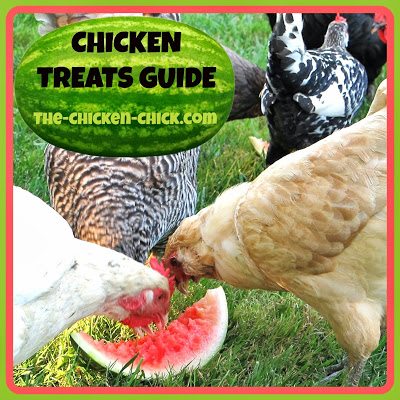
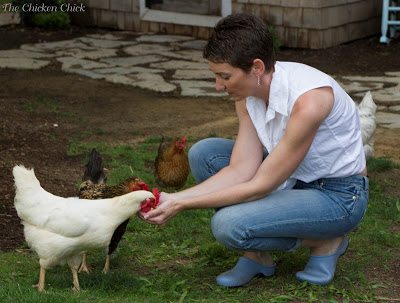
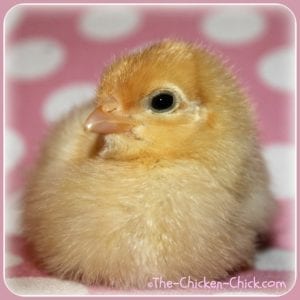
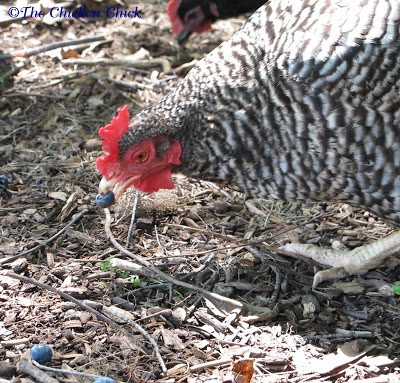
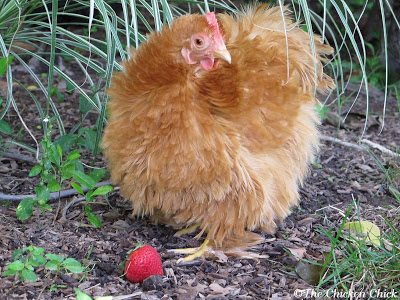
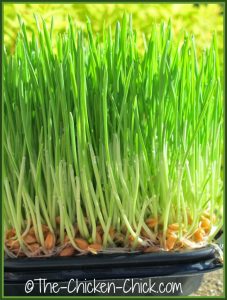
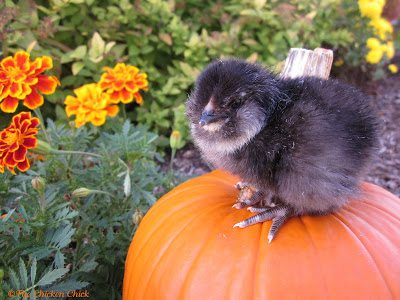
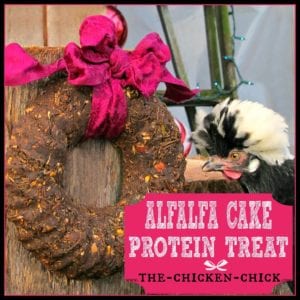
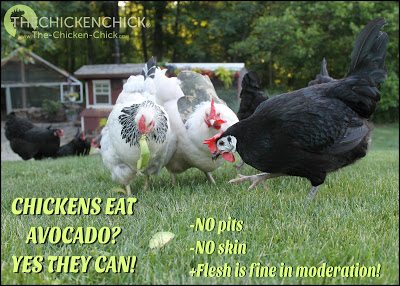
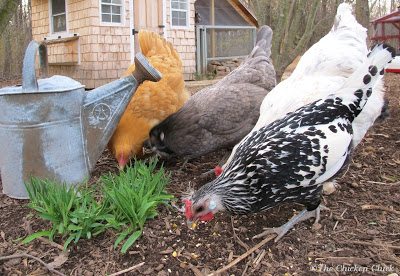
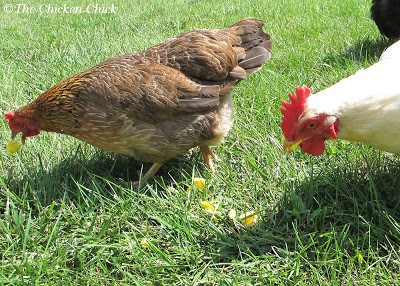
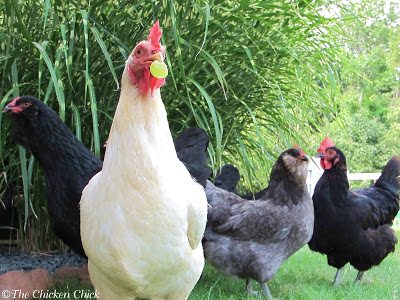

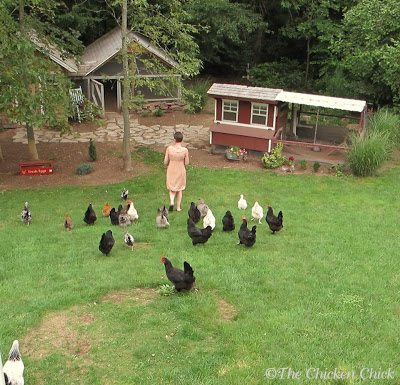
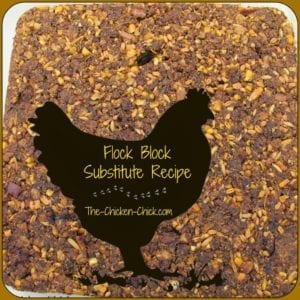
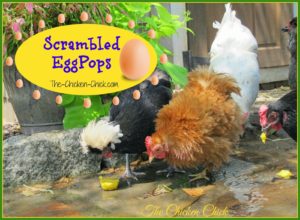
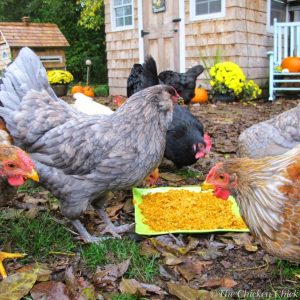






















I am so new to this… I'm trying not to over-treat them, but they are so cute! I've been sparing with the kitchen treats, and almost exclusively fruits and vegetables. My oldest hen loves cauliflower, and they all go crazy for blueberries. I did not know you weren't supposed to mix the scratch with the laying pellets, and I had already mixed them, so I had to go buy another large bag of pellets to mix in to dilute the scratch to a much smaller ratio. Live and learn. I won't mix them next time. I'm getting close to letting… Read more »
I'd love to win!!! I have four month old chicks and have yet to give them treats but I am sure they are eager for me too!!! HAHA! Thanks for the chance to win!!!
Thank you for all the great info. I love watching my chicks try new treats. I wondered how they'd know to eat the grit, too, but nature is an amazing thing – they take from the grit dish on days they have treats, but when they just have their feed, they don't.
Love you on face book and now through e mail. Lots of info for this new chick mama
I would love to be entered into your giveaway. My Tractor Supply doesn't carry a lot of the treats I see that others feed their chickens. I can get meal worms and they love them but as far as any other treats, they don't carry. :( Mine do love the dried meal worms. Thanks again. queenb@epix.net